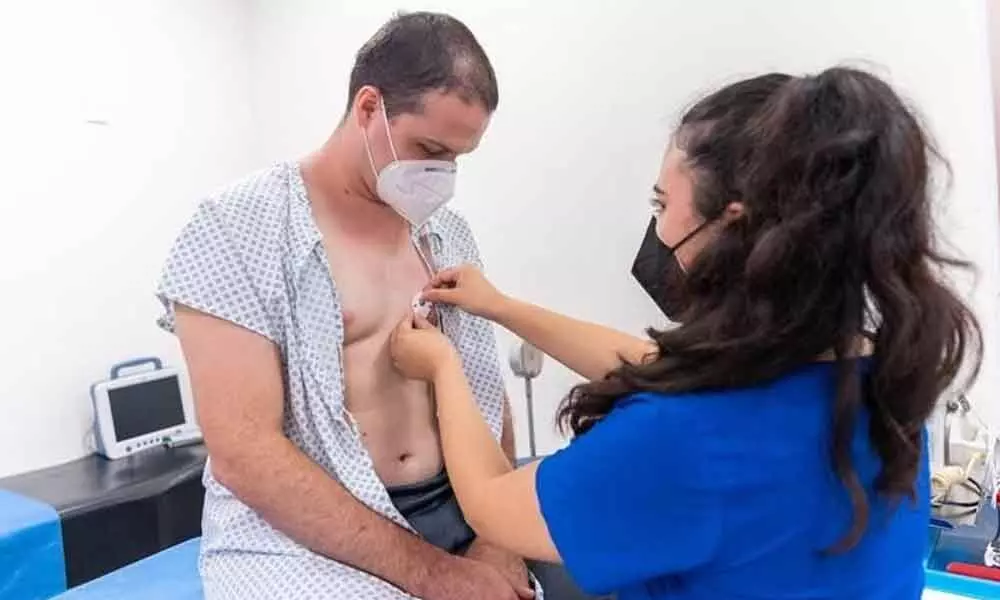Get screened every six months after Covid recovery

Get screened every six months after Covid recovery
COVID-19 has led to complications and health risks manifold for patients with non-communicable diseases.
COVID-19 has led to complications and health risks manifold for patients with non-communicable diseases. Almost 75-80 percent of the COVID patients don't require hospitalisation and can recover at home with teleconsultation, but COVID-19 infections can leave the patient with long-term side effects. There are many instances where symptoms of COVID-19 have persisted for several months. Apart from damaging the lungs, the virus can also cause acute myocardial injury and chronic damage to the cardiovascular system.
According to research published in the European Heart Journal, Covid-19 patients who suffer cardiac arrest have a higher possibility of dying as compared to those who are not infected with it, and especially women are at an increased risk of death for the same reason. The virus may directly breach the ACE2 receptor cells, within the myocardium tissue and cause direct viral harm. COVID can result in inflammation of the heart muscles which is known as myocarditis and it can lead to heart failure over time, if not taken care of.
People with a pre-existing heart problem need to be extra cautious. A significant number of patients have suffered cardiac arrest during the recovery period, often resulting in death. Expert suggests that even though the COVID virus wanes, the immune response continues to be hyper-active and that often ends up attacking other organs. It has been observed that almost 80 per cent of these patients have had cardiac arrests 2-3 weeks after testing COVID positive.
We tend to ignore some of the warning signs and due to lack of awareness, sometimes, we fail to prevent certain cardiovascular issues during COVID or even after recovering from COVID. After someone has had COVID-19, if that patient is experiencing a rapid heartbeat or palpitations, it is recommended to contact the doctor immediately because even a temporary increase in heart rate can signal a lot of different things, including the aftermath of being very ill, prolonged inactivity and spending weeks convalescing in bed and even dehydration.
It is necessary to make sure that the patient is drinking enough fluids, especially if the fever persists. Sometimes, people who are recovering from COVID may show symptoms of a condition known as POTS (Postural Orthostatic Tachycardia Syndrome). However, the link between the development of POTS and COVID is yet to be established. Although, POTS is a neurologic problem, and it is not directly a cardiac issue. It affects the part of the nervous system and may hamper the heart rate and blood flow. The syndrome can also cause rapid heartbeats while standing up. Some of the symptoms of a rapid or irregular heart rhythm may include:
♦ Feeling of a rapid or irregular heartbeat in the chest (palpitations)
♦ Shortness of breath
♦ Feeling lightheaded or dizzy, especially upon standing
♦ Brain fog
♦ Fatigue
♦ Chest pain
♦ Rapid ups and downs in the pulse rate
Several instances of cardiac arrests post COVID recovery has emphasized the importance of frequent monitoring of heart health. As per experts, cardiac tests like ECG, X-Ray Chest, and lipid profile should be repeated every six months in high-risk individuals with pre-existing conditions like diabetes and hypertension in order to understand whether there is any damage to the heart. Apart from regular monitoring, post-COVID patients must stick to a healthy diet consisting of all the essential nutrients and spicy, oily, canned, artificial sweeteners and processed flavours, or junk food should be strictly avoided. Taking out time for physical exercise, cutting down on alcohol and smoking is necessary. Even the smallest of the symptoms should be taken into consideration and should be immediately addressed by an expert doctor.
(The author is Dr TS Kler, Chairman, Fortis Heart & Vascular Institute, Gurugram & Fortis Hospital, Vasant Kunj)




